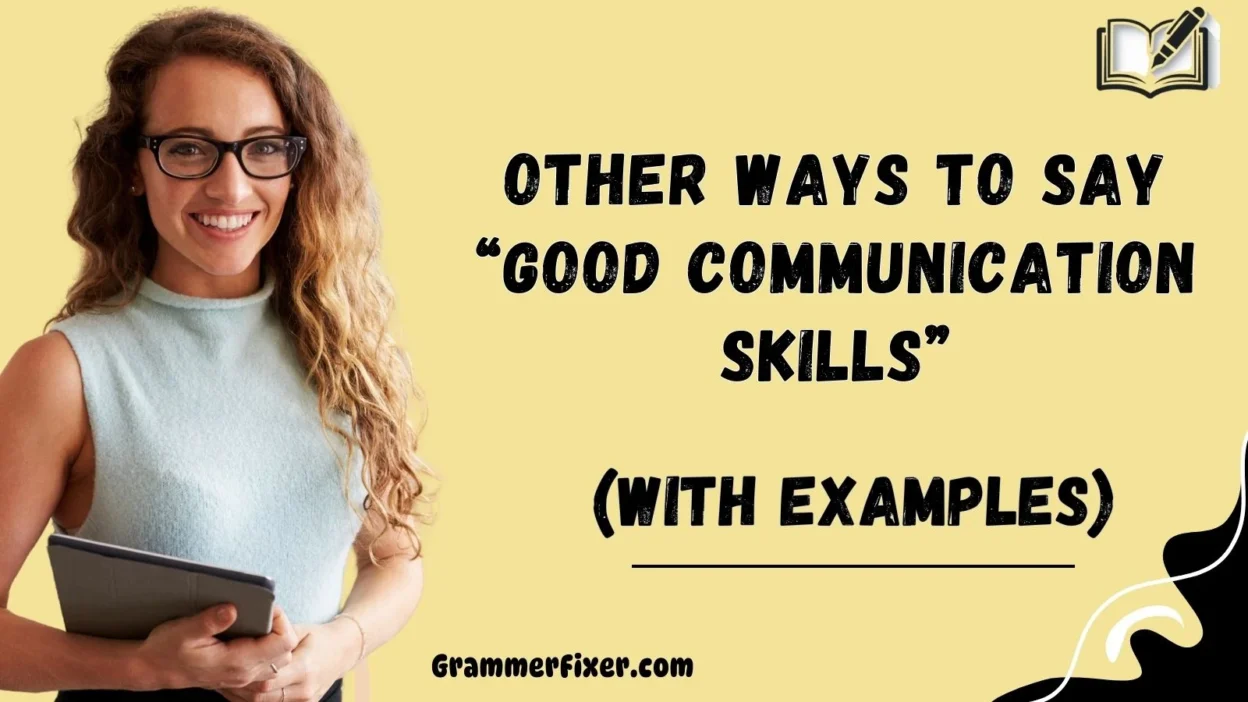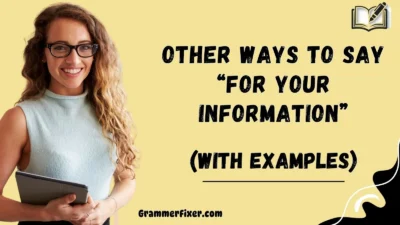Finding the right words to describe someone’s strengths isn’t always easy. Saying a person has “good communication skills” is common, but it can sometimes feel overused, vague, or impersonal. Whether you’re writing a resume, giving feedback, or simply expressing admiration, choosing warm, thoughtful, and precise alternatives can make your words resonate more deeply.
This article offers 30 empathetic, professional, and human-centered alternatives to “good communication skills,” with clear meanings, examples, and the right contexts to use them.
What Does “Good Communication Skills” Mean?
Good communication skills generally describe a person’s ability to express themselves clearly, listen actively, and engage with others in a way that builds understanding. It also involves respect, empathy, and adaptability in conversations—whether in writing, speaking, or nonverbal communication.
When to Use “Good Communication Skills”?
You can use this phrase when:
- Writing a resume or cover letter
- Giving performance feedback
- Describing a teammate, colleague, or leader
- Highlighting a student’s or professional’s strengths
- Emphasizing relationship-building abilities
Is It Professional/Polite to Say “Good Communication Skills”?
Yes, it is professional and polite. However, because it is broad and generic, it often lacks the personal touch that makes feedback or descriptions truly memorable. Using a more specific and empathetic alternative shows care and attentiveness in your words.
Pros or Cons of Using “Good Communication Skills”
Pros:
- Professional and widely understood
- Easy to include in resumes or reviews
- Neutral and positive
Cons:
- Overused and vague
- Doesn’t capture the depth or nuance of someone’s actual strengths
- Can feel impersonal if repeated often
1. Strong Interpersonal Abilities
Meaning: Highlights the ability to connect and build relationships effectively.
Detailed Explanation: This phrase emphasizes a person’s capacity to engage with others thoughtfully, with care and respect. It goes beyond just speaking well—it reflects relationship-building skills.
Scenario Example:
- “Sarah has strong interpersonal abilities, which make her an excellent team leader.”
Best Use: Resumes, professional reviews, leadership contexts.
Worst Use: Casual conversations—it may sound too formal.
Tone: Professional, respectful, appreciative.
2. Excellent Listener
Meaning: Focuses on the ability to listen actively and attentively.
Detailed Explanation: Communication isn’t just about talking—it’s about truly hearing others. This phrase shows the person is empathetic, patient, and attentive.
Scenario Example:
- “One of Ahmed’s strengths is that he’s an excellent listener, always making colleagues feel valued.”
Best Use: Team reviews, mentoring contexts, leadership roles.
Worst Use: Job descriptions—it’s better suited for feedback.
Tone: Warm, empathetic, caring.
3. Clear and Articulate Communicator
Meaning: Someone who expresses ideas in a structured, understandable, and confident manner.
Detailed Explanation: This phrase emphasizes clarity, fluency, and articulation, making it ideal for describing people in presentations, teaching, or client-facing roles.
Scenario Example:
- “Maria is a clear and articulate communicator who makes even complex topics easy to understand.”
Best Use: Professional bios, resumes, recommendation letters.
Worst Use: Informal compliments—it may sound overly technical.
Tone: Professional, polished, confident.
4. Empathetic Communicator
Meaning: Someone who communicates with understanding, kindness, and compassion.
Detailed Explanation: This phrase highlights not just clarity, but also the emotional warmth behind words. It’s perfect for counseling, leadership, healthcare, or mentoring roles.
Scenario Example:
- “As a manager, John is an empathetic communicator who ensures his team feels heard and supported.”
Best Use: Feedback, leadership development, HR.
Worst Use: Technical resumes—it might lack precision there.
Tone: Warm, caring, compassionate.
5. Effective at Building Rapport
Meaning: Describes someone who easily builds trust and connection in conversations.
Detailed Explanation: This alternative emphasizes relationship-building, trust, and emotional intelligence rather than just language skills.
Scenario Example:
- “Mark is effective at building rapport with clients, which helps establish long-term partnerships.”
Best Use: Sales, networking, client-facing roles.
Worst Use: Academic writing—it may sound too casual.
Tone: Relational, professional, approachable.
6. Skilled in Conflict Resolution
Meaning: Strong at navigating disagreements constructively.
Detailed Explanation: This phrase emphasizes the ability to address disputes calmly and fairly, ensuring outcomes are beneficial for all parties.
Scenario Example:
- “Lina is skilled in conflict resolution, helping colleagues find common ground during disagreements.”
Best Use: HR, leadership, team settings.
Worst Use: Resumes for purely technical jobs.
Tone: Professional, diplomatic, calm.
7. Persuasive Communicator
Meaning: Able to influence others with logic and empathy.
Detailed Explanation: This alternative highlights confidence, clarity, and emotional intelligence in communication.
Scenario Example:
- “Daniel is a persuasive communicator who inspires buy-in from clients and stakeholders.”
Best Use: Sales, leadership, advocacy roles.
Worst Use: Feedback for someone introverted—it may feel mismatched.
Tone: Confident, strategic, inspiring.
8. Collaborative Communicator
Meaning: Works well with others through open and inclusive dialogue.
Detailed Explanation: This phrase focuses on teamwork, listening, and adaptability—qualities that make someone a strong team player.
Scenario Example:
- “Priya is a collaborative communicator who encourages input from every team member.”
Best Use: Team evaluations, group projects, HR reviews.
Worst Use: Solo professional bios—it may feel out of place.
Tone: Inclusive, approachable, positive.
9. Confident Speaker
Meaning: Someone who communicates with poise and assurance.
Detailed Explanation: This describes a person’s ability to speak with authority without being overbearing, making them effective in presentations and meetings.
Scenario Example:
- “Alex is a confident speaker who captivates audiences during presentations.”
Best Use: Resumes, bios, public speaking contexts.
Worst Use: Feedback for shy employees—it may feel inaccurate.
Tone: Polished, professional, self-assured.
10. Diplomatic in Conversations
Meaning: Handles sensitive topics with tact, care, and fairness.
Detailed Explanation: This alternative is perfect for people who are considerate and respectful, even during disagreements.
Scenario Example:
- “Amira is diplomatic in conversations, always choosing words that maintain harmony.”
Best Use: HR, leadership, cross-cultural communication.
Worst Use: Technical or creative resumes—it may sound irrelevant.
Tone: Respectful, tactful, calm.
11. Engaging Storyteller
Meaning: Captures attention and conveys ideas through relatable narratives.
Detailed Explanation: Storytelling is a powerful communication tool. This phrase highlights someone’s ability to make messages memorable and impactful.
Scenario Example:
- “Jacob is an engaging storyteller who makes training sessions inspiring and enjoyable.”
Best Use: Presentations, teaching, leadership.
Worst Use: Formal evaluations—it may sound casual.
Tone: Warm, lively, expressive.
12. Excellent at Active Listening
Meaning: Focuses intently on others, ensuring mutual understanding.
Detailed Explanation: Active listening means acknowledging, clarifying, and reflecting during conversations to build trust.
Scenario Example:
- “Sophia is excellent at active listening, always making her team feel valued.”
Best Use: Mentorship, counseling, HR.
Worst Use: Resume bullet points—it’s better in feedback.
Tone: Compassionate, patient, attentive.
13. Able to Convey Complex Ideas Clearly
Meaning: Translates complicated concepts into simple, understandable terms.
Detailed Explanation: This phrase shows strength in breaking down complexity for audiences of varying expertise.
Scenario Example:
- “Leo is able to convey complex ideas clearly, making technical content accessible.”
Best Use: Teaching, client-facing roles, technical jobs.
Worst Use: Feedback for entry-level roles—it may overstate skills.
Tone: Clear, structured, approachable.
14. Empowering Communicator
Meaning: Uplifts and motivates others through supportive dialogue.
Detailed Explanation: Highlights communication that encourages confidence and action in others.
Scenario Example:
- “Nadia is an empowering communicator, always inspiring her team to reach their goals.”
Best Use: Leadership, HR, coaching.
Worst Use: Technical job descriptions.
Tone: Motivational, supportive, warm.
15. Strong Negotiation Skills
Meaning: Excels at reaching agreements that satisfy all sides.
Detailed Explanation: This phrase shows ability in persuasion, compromise, and fairness during discussions.
Scenario Example:
- “Ravi has strong negotiation skills, ensuring favorable outcomes for the company.”
Best Use: Business, legal, HR.
Worst Use: Creative roles where negotiation isn’t central.
Tone: Strategic, practical, confident.
16. Culturally Sensitive Communicator
Meaning: Respectful and adaptive when engaging with diverse cultures.
Detailed Explanation: This phrase is ideal for global or multicultural contexts where awareness and respect are vital.
Scenario Example:
- “Aisha is a culturally sensitive communicator who thrives in international collaborations.”
Best Use: Global teams, diplomacy, HR.
Worst Use: Domestic-only contexts.
Tone: Respectful, inclusive, considerate.
17. Transparent and Honest in Dialogue
Meaning: Communicates openly, with integrity and trustworthiness.
Detailed Explanation: Highlights someone who values clarity, authenticity, and trust in every interaction.
Scenario Example:
- “Tom is transparent and honest in dialogue, fostering trust in his team.”
Best Use: Leadership, HR, client relations.
Worst Use: Sales pitches—it may sound generic.
Tone: Trustworthy, forthright, authentic.
18. Adaptable Communicator
Meaning: Adjusts communication style depending on the audience.
Detailed Explanation: Shows flexibility, awareness, and skill in handling different contexts.
Scenario Example:
- “Mei is an adaptable communicator who can switch easily from technical to casual conversations.”
Best Use: Multidisciplinary teams, leadership, HR.
Worst Use: Narrow, single-role jobs.
Tone: Flexible, professional, versatile.
19. Constructive Feedback Provider
Meaning: Offers feedback that is helpful, respectful, and solution-focused.
Detailed Explanation: A key leadership trait—this phrase emphasizes guidance without criticism.
Scenario Example:
- “Ella is a constructive feedback provider who helps her colleagues grow with kindness.”
Best Use: Mentorship, leadership, HR.
Worst Use: Formal resumes—it’s better for reviews.
Tone: Supportive, considerate, positive.
20. Calm and Composed Under Pressure
Meaning: Communicates steadily even in stressful situations.
Detailed Explanation: Emphasizes the ability to remain clear, respectful, and confident during conflict or crisis.
Scenario Example:
- “Omar is calm and composed under pressure, ensuring smooth communication during emergencies.”
Best Use: Crisis management, healthcare, leadership.
Worst Use: Informal compliments—it may sound heavy.
Tone: Reassuring, professional, steady.
21. Facilitates Open Dialogue
Meaning: Encourages honest, respectful, and productive conversations.
Detailed Explanation: This phrase emphasizes the ability to create safe spaces where everyone feels comfortable sharing ideas or concerns.
Scenario Example:
- “Emma facilitates open dialogue, ensuring her team members feel heard and respected.”
Best Use: Leadership reviews, HR evaluations, mentorship roles.
Worst Use: Technical resumes—it may feel out of place.
Tone: Inclusive, approachable, respectful.
22. Fluent and Expressive Speaker
Meaning: Speaks with ease, clarity, and emotional expression.
Detailed Explanation: This alternative is ideal for describing someone who balances fluency with warmth, making their words engaging.
Scenario Example:
- “Carlos is a fluent and expressive speaker who captures attention in every meeting.”
Best Use: Resumes, client-facing roles, public speaking.
Worst Use: Casual notes—it may sound too formal.
Tone: Polished, lively, confident.
23. Empathetic Listener
Meaning: Someone who not only hears words but also understands emotions behind them.
Detailed Explanation: Empathetic listening is about validating feelings and responding with care, which builds trust and belonging.
Scenario Example:
- “Maya is an empathetic listener who supports colleagues through challenges with genuine care.”
Best Use: Counseling, healthcare, HR, team reviews.
Worst Use: Strictly technical bios—it might sound irrelevant.
Tone: Warm, compassionate, supportive.
24. Excellent at Giving Presentations
Meaning: Skilled in delivering clear, confident, and impactful talks.
Detailed Explanation: Goes beyond speaking—it highlights preparation, structure, and audience engagement.
Scenario Example:
- “Ryan is excellent at giving presentations, making complex topics accessible and engaging.”
Best Use: Academic, professional, or client-facing contexts.
Worst Use: General feedback—it may feel too specific.
Tone: Confident, structured, professional.
25. Polished Communicator
Meaning: Professional, refined, and articulate in delivery.
Detailed Explanation: Suggests a high level of professionalism and confidence, perfect for describing leaders or executives.
Scenario Example:
- “Isabella is a polished communicator who represents the company with excellence.”
Best Use: Executive bios, resumes, leadership reviews.
Worst Use: Casual notes—it may sound pretentious.
Tone: Professional, refined, confident.
26. Strong Written Communication Skills
Meaning: Excels in emails, reports, and professional documents.
Detailed Explanation: Highlights clarity, tone, and structure in writing—an essential modern workplace skill.
Scenario Example:
- “James has strong written communication skills, ensuring reports are always clear and well-organized.”
Best Use: Resumes, job descriptions, academic contexts.
Worst Use: Feedback on verbal-only interactions.
Tone: Clear, professional, precise.
27. Warm and Approachable Communicator
Meaning: Someone who makes others feel comfortable and welcomed.
Detailed Explanation: Focuses on friendliness, openness, and empathy—qualities that strengthen workplace trust.
Scenario Example:
- “Anna is a warm and approachable communicator, making it easy for colleagues to share ideas.”
Best Use: HR, leadership, teamwork.
Worst Use: Highly formal documents.
Tone: Friendly, caring, approachable.
28. Strong Facilitation Skills
Meaning: Guides discussions and meetings effectively.
Detailed Explanation: This phrase shows someone can lead group conversations, keep discussions productive, and encourage participation.
Scenario Example:
- “David has strong facilitation skills, ensuring every meeting runs smoothly and inclusively.”
Best Use: Leadership, HR, teaching, training.
Worst Use: One-on-one feedback—it may sound too formal.
Tone: Professional, organized, inclusive.
29. Clear and Concise Communicator
Meaning: Delivers information directly and efficiently, without confusion.
Detailed Explanation: This alternative highlights brevity, clarity, and impact, making it great for high-pressure environments.
Scenario Example:
- “Sophia is a clear and concise communicator, ensuring projects stay on track.”
Best Use: Resumes, technical roles, project management.
Worst Use: Warm, personal notes—it may feel too formal.
Tone: Direct, professional, efficient.
30. Compassionate and Thoughtful Speaker
Meaning: Balances clarity with kindness and emotional awareness.
Detailed Explanation: This phrase emphasizes communication that is not only clear but also gentle, caring, and considerate of others’ feelings.
Scenario Example:
- “Michael is a compassionate and thoughtful speaker, always mindful of how his words affect others.”
Best Use: Leadership, HR, healthcare, personal references.
Worst Use: Strictly technical resumes.
Tone: Warm, empathetic, considerate.
Conclusion
Describing someone with just “good communication skills” can feel limiting. By choosing more specific, empathetic, and professional alternatives, you highlight not only their abilities but also their human qualities.
- Best Uses: Leadership reviews, resumes, mentorship, HR, client relations.
- Worst Uses: Casual, overly short notes where detail isn’t needed.
- Tone Across Alternatives: Ranges from professional and polished to warm and compassionate, allowing you to select the best fit for your context.
Using these alternatives shows that you value clarity, care, and thoughtfulness—because communication isn’t just about words, it’s about how those words make others feel, connect, and grow.



